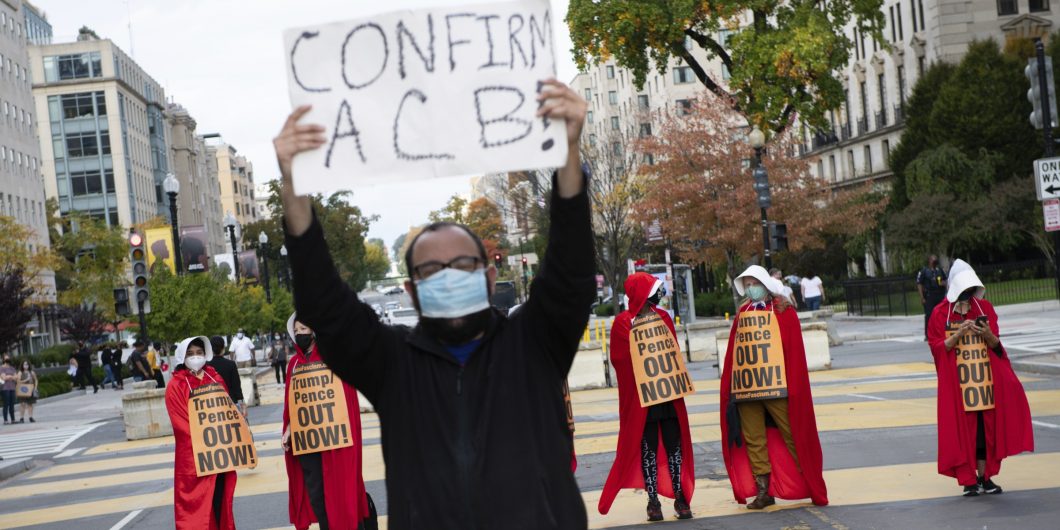Republican presidential candidates will likely use nominee lists to demonstrate their commitments to originalism and constitutional government.
2020: A Mixed Bag for Classical Liberalism
While 2020 has been a dreadful year because of Covid-19, its results for classical liberalism have been more varied. The appointment of Amy Coney Barrett has made the Court more originalist and thus more classically liberal than it has been for over a century. The results of the 2020 election were mixed. The candidate decidedly hostile to classical liberalism won, but his party fared far worse than expected when the recession and pandemic might have predicted a blowout in its favor. Nevertheless, the culture has become even less hospitable to classical liberalism with wokeness infecting not only our universities but our corporations. Because elective politics and the judiciary are ultimately transformed by culture, these cultural shifts create a negative balance sheet for classical liberalism as a new decade begins.
The Court
For decades, appointments to the Supreme Court have promised to change it from a dynamo of progressivism to a court that adheres to the Constitution as written. And for decades those promises have gone unfulfilled. The Burger Court was famously the revolution that wasn’t. Most of President Nixon’s appointees voted to create a right to abortion out of whole cloth. Sandra Day O’Connor proved more a politician than a jurist, splitting the difference rather than reading the text. Anthony Kennedy spouted aphorisms worthy of fortune cookies rather than locating his reasoning in the original meaning of our fundamental law. Chief Justice John Roberts seems very focused on maintaining the Court’s institutional capital even at the expense of sound reasoning. A fundamental reason for all these failures is that many appointees by Republicans have drifted leftward during their tenure, while no recent appointee of a Democrat has moved to the Right.
But the long period of failure to fundamentally change the Court has ended with Barrett’s confirmation. Chief Justice Roberts is no longer the swing justice. Originalists are a plurality, if not a majority, on the Court and as the justices themselves realize, originalism will be the framework for constitutional decision-making.
Originalism advances classical liberalism because the Constitution is largely a product of applied and practical classical liberalism. Its rights are negative liberties against the state, not positive claims to the state’s assistance. It creates a structure of tricameralism, requiring passage of a law by two houses, whose members are elected for different terms and mostly at different times, and the signature of the President or a two-thirds supermajority to overcome his veto. Action by the federal government is thus purposely difficult to achieve. To be sure, the Court’s permissive delegation doctrine has allowed administrative agencies to rule by fiat without compromise on specific rules, but that doctrine is likely to be modified by the new Court.
The difficulty of forging federal law, in turn, makes states more pivotal in politics and creates the beginning of subsidiarity. That structure is also classically liberal in nature, as states (and cities within them) must compete in a market for governance.
The Constitution does not directly instantiate a set of classical liberal policies, like free market economics, but it creates a structure of limited government where such policies have a better chance of being sustained. 2020 thus marks the return to a real possibility of a Constitution friendly to classical liberalism—a great achievement due in no small measure to Donald Trump.
Elections
The more classically liberal candidate lost the election for President. Trump’s appointments to both the Supreme Court and lower courts would have continued to advance originalism and a classically liberal framework of governance. Biden’s will do the opposite. Biden wants to grow the state enormously. Trump, while no sound steward of fiscal affairs, is not so profligate. Trump is, on the whole, a deregulator, Biden a regulator. In particular, Biden will increase government involvement in health care to the detriment of innovation and efficient pricing and pave the way for single-payer. Even without Congress, he promises to interfere with the labor market. Classical liberals were rightly worried about some of Trump’s trade policies. But Biden has already announced a moratorium on pacts that would create freer trade.
The Left’s attack on merit is ultimately an attack on liberty because only a hierarchy enforced by law can prevent a meritocracy from developing in a modern society.
To be sure, there were reasons for a classical liberal to vote against the President, but they largely revolved around his failure to suitably fill the office of head of state, thereby degrading the essential symbolic and unifying function of the presidency.
While from the classical liberal perspective Trump was clearly the better, if far from perfect, candidate on policy, his defects as head of state often brought these policies into disrepute. Thus, his loss is not quite as much a blow to classical liberalism as it would otherwise be. And the rest of the election was far from a disaster. The more classically liberal party gained substantial seats in the House and may well retain the Senate—this despite a pandemic and recession that typically favors a party of big government.
Moreover, the results of the most important referenda—the most direct expression of the people’s will—leaned in the classical liberal direction. Most importantly, the voters in California—a state that regularly elects leftists to office—voted decisively to retain its prohibition on race and gender preferences in government jobs and state university admissions. In my own state of Illinois, the electorate rejected a progressive income tax, so disgusted was it with its bloated and corrupt government—a problem it shares with many other jurisdictions run on principles opposed to classical liberalism.
Culture
Despite the great improvement in the judicial branch of government and tolerable results in the election, classical liberalism remains in peril because of an ongoing cultural revolution. Classical liberalism was propelled by the culture of the enlightenment—its valorization of the individual, its celebration of merit, and its adherence to an empirical view of the world. All these tenets of enlightenment thinking are under threat today, and classical liberalism cannot survive as a philosophy of governance unless they remain dominant.
First, identity politics is intensifying its grip on the United States. Universities, including my own, declare themselves “antiracist” institutions, while making race and gender the preferred prism of all thought outside the hard sciences. Some of our corporate culture now resembles the elite universities. That is not surprising because these universities are the pipeline to the high ranks of corporations. And unfortunately, some aspects of Trumpism have themselves taken on an aspect of identity politics, wrongly viewing the United States more as an ethnic polity like France or Germany than one dedicated to ideals consonant with classical liberalism.
Individualism is closely related to the creation of a meritocracy embodying the enlightenment idea that the individual rises according to his or her talents. An open society determines what talents are most needed. Today, however, the meritocracy is under sustained critique. The attack on merit is ultimately an attack on liberty because only a hierarchy enforced by law can prevent a meritocracy from developing in a modern society. We are seeing the first proposals that reflect this assault from efforts at allocating slots in selective public schools according to race to abolishing private schools.
Finally, a deeply antiempirical spirit stalks the land. This development is, in part, related to identity politics because that politics assumes, against all evidence, that all disparate results among different groups are the results of disparate treatment (although sophisticated analysts, like Thomas Sowell, have shown that the causes are in fact very complex). But that antiempirical turn transcends identity politics and has its roots in the need for many to live by some secular myth that will explain the entire world. The continuing inability of some supporters of Donald Trump to accept the reality of his defeat may also reflect the need to live in a world of fantasy. Social myths fit uneasily with complicated facts, which thus must be suppressed.
The future of culture is unpredictable. Moral relativism, for instance, was on the rise until 9/11 seemed to make it untenable. But the key features that have been undermining the enlightenment culture on which classical liberalism rests have been gaining strength for a long time. The political correctness on which the more virulent identity politics of our time builds began in the 1980s. The decline of mainstream religion has been ongoing for a century. It is these underlying trends that make me most concerned about the future of classical liberalism, even as it now has gained a redoubt in our judiciary and retained a perch in our politics.



